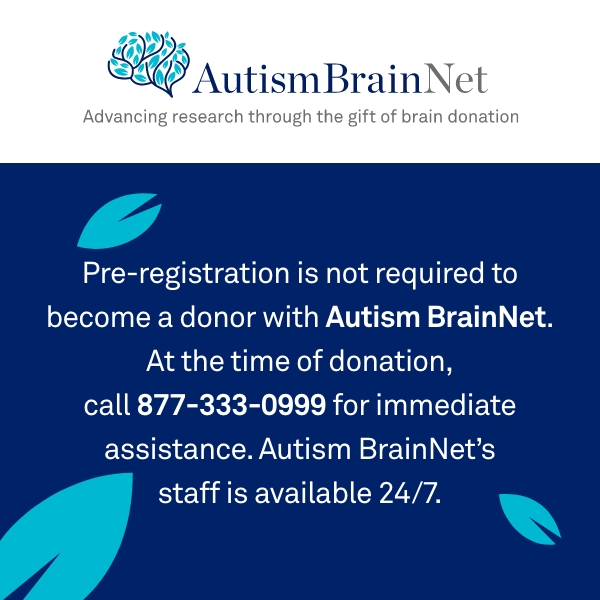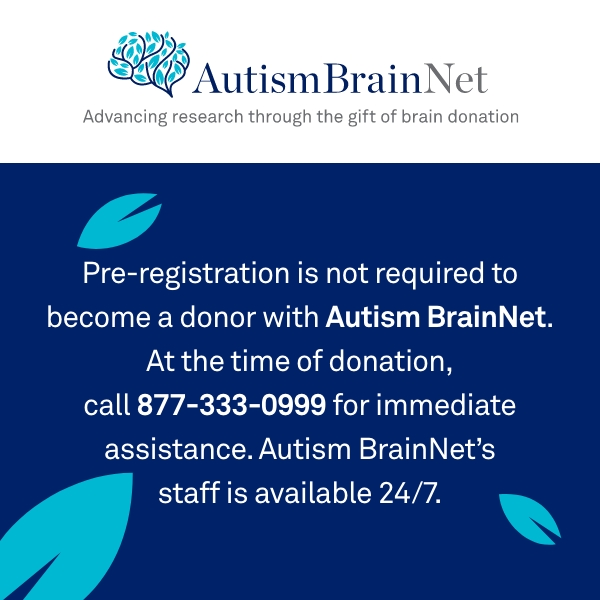Organ Tissue Donation

Project 8p Foundation’s partnership with Autism BrainNet does not mean that anyone anticipates your 8p Hero will experience a premature passing. It does, however, serve as a resource so you are aware of your options if such an unexpected and tragic event were to occur. Similar to organ tissue donation, this program provides families with an opportunity to donate brain and tissue of a loved one.
Organ Tissue Donation is open to all individuals diagnosed with an 8p disorder, regardless of whether they have been diagnosed with Autism or not.
Autism BrainNet is a program of the Simons Foundation Autism Research Initiative (SFARI) that promotes innovative, high-quality research on postmortem brain tissue to improve the understanding of the biological causes of autism spectrum disorder (ASD) and related neurodevelopmental conditions.
We work with Autism BrainNet to promote a greater knowledge of neurodevelopmental conditions and brain tissue research, while ensuring the smoothest donation process for families during a very difficult time.
Why is brain tissue research important?
Studying postmortem brain tissue can lead to a better understanding of the cellular and molecular changes associated with ASD and related neurodevelopmental conditions in the human brain, as well as identify targets for new and effective treatments.
How does the donation process work?
Autism BrainNet makes the donation process as simple as possible for every family. Donor families are treated with respect and compassion and provided with ongoing support.
These are the steps involved in the process of brain donation to Autism BrainNet:
- Call Autism BrainNet at 877-333-0999 for immediate assistance (optimally within 24 hours of the death of a loved one). If death is near, you can call Autism BrainNet to make plans for donation. Autism BrainNet’s staff is available 24/7 and will walk your family through the donation process.
- Autism BrainNet coordinates brain recovery and transportation to their nearest site.
- An Autism BrainNet clinician follows up with the donor family to schedule a video meeting or home visit to learn more about the donor.
There is no cost to families, and brain donation does not interfere with autopsy or funeral plans. Autism BrainNet’s staff can be contacted anytime to answer questions or concerns about the brain donation process.
Pre-registration is not required to become a donor with Autism BrainNet. However, you can download and print the Intent to Donate Postmortem Brain Tissue for Research form and an Autism BrainNet Brain Donor Card to include in your preplanning documents.
How does the donation process work?
Autism BrainNet makes the donation process as simple as possible for every family. Donor families are treated with respect and compassion and provided with ongoing support. These are the steps involved in the process of brain donation to Autism BrainNet:
- Call Autism BrainNet at 877-333-0999 for immediate assistance (optimally within 24 hours of the death of a loved one). If death is near, you can call Autism BrainNet to make plans for donation. Autism BrainNet’s staff is available 24/7 and will walk your family through the donation process.
- Autism BrainNet coordinates brain recovery and transportation to their nearest site.
- An Autism BrainNet clinician follows up with the donor family to schedule a video meeting or home visit to learn more about the donor.

How can I learn more about brain tissue research and Autism BrainNet?
Families are welcome to subscribe to the Autism BrainNet’s newsletter to receive program and scientific updates. To sign up, visit: autismbrainnet.org/newsletter.
For more information about Autism BrainNet and the donation process:
Call 1-877-333-0999 | Visit autismbrainnet.org | Email info@autismbrainnet.org







